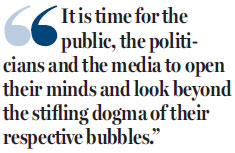Blinkered political engagement only skews democracy
Updated: 2016-12-12 10:20
By Jon Lowe(HK Edition)
|
|||||||
Jon Lowe writes that from Washington to HK,media and political bubbles are causing people to stubbornly ignore reality and demand the impossible
The prediction of a Chinese monkey was borne out on Nov 9 when Donald J. Trump romped to victory in the US presidential election. If the result could be intuited by a seemingly psychic simian in Hunan, how could the world's media have got it so wrong? One possible interpretation is that the media, dominated by social progressives and Clinton supporters, had come to exist in a bubble. Trump, with his mix of "home-speak" or banter, wit, strong messages, grievances, and sheer drive, seduced a lot of people. But the media didn't seem to realize just how many people were susceptible to Trump's rhetoric. According to an ex-Washington Post journalist I spoke to recently, the US mainstream media's big problem these days is there are no longer writers/editors with working-class or middle-American roots on the big six newspapers, while those same papers have closed down most of their national bureaus and so have lost touch with the majority of the public. Adding to the mainstream media's problem is that many people see their coverage as partisan and have been deserting in droves to alternative online news media, thus creating yet another media bubble. The results of these competing bubbles are being seen now in the war over "fake news" in the worldwide media, in which social media news feeds especially are being scrutinized both for inaccuracy and the way they filter out information according to users' existing tastes.

We see the problem of "bubble-think" in Hong Kong as well, where social media bubbles could be said to be even worse than in the US. The two young politicians at the center of the oath-taking furor were undoubtedly influenced exclusively by their separatist cohorts and their social media bubble to think it was a good idea to insult the entire Chinese people in pursuit of their aims. And many of the "pan-democrats", evidently starved of the oxygen of common sense in their own political bubble, lost sight of public opinion when they egged on the two separatist would-be lawmakers - before the pair were barred from entering the Legislative Council, that is. With blinkers donned, the "pan-democrats" were only too willing to court the forces of chaos at a time when the LegCo needs focus and consensus to advance livelihood issues.
Bubble-bound pro-independence actors in Hong Kong stubbornly ignore the reality that their impossible demands are doomed to failure, and their actions only risk bringing about or expediting the very things they claim to be so afraid of, such as greater oversight by the national parliament. It is therefore not surprising that more moderate actors or observers, such as former governor Chris Patten or millions of Hong Kong people, are irked by them. But this doesn't stop these young radicals banging their heads against the proverbial brick wall - which of course will only result in sore heads, while their need to get a job persists. In this regard they are like the "butthurt" progressives in the US who are refusing to accept Trump as their head of state and protesting in the streets while screaming obscenities or scrawling "Not my president" across their body parts, and who have convinced themselves in their bubble that Trump is the new Hitler and is set to gas large sections of the population.
It could be said that sections of Hong Kong's population share similarly hysterical fears about the central government in regard to the SAR. Unfortunately, many millennials in Hong Kong seem to be sympathetic to the ideology of separatism, a brand of politics that cannot reconcile with others in society. Of course, just as in the US, many of those engaging in the protest culture are students, so their actions should be taken with a healthy dose of salt. Yet despite their expensive education, none can explain how Hong Kong might peel away from the nation which controls its defense, water supply and other resources, not to mention has a rock-solid basis for sovereignty - the legal, political and cultural aspects of which have been comprehensively outlined in this newspaper. But the screening out of rational arguments that contradict emotional beliefs is one of the hallmarks of bubble-think.
People in Hong Kong would do well to remember that its "One Country, Two Systems" framework is an experiment, and their actions will have even greater repercussions when the results of that experiment are analyzed and conclusions reached on it. This is one reason why Patten called support for pro-independence "reckless". Young people, especially, should engage their rational minds more and remember that though they have a penchant for scorched-earth politics now, we will not see the real consequences of this until the "no change for 50 years" period elapses and they themselves are "old" and have largely abandoned their radical posturing. It is time for the public, the politicians and the media to open their minds and look beyond the stifling dogma of their respective bubbles.
The author is a seasoned journalist who has worked in many places in the world.
(HK Edition 12/12/2016 page1)